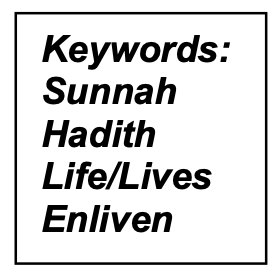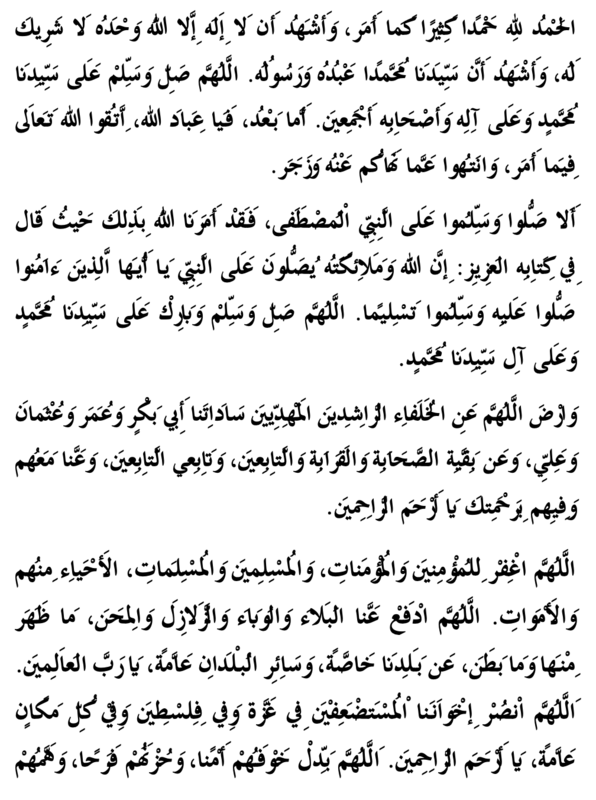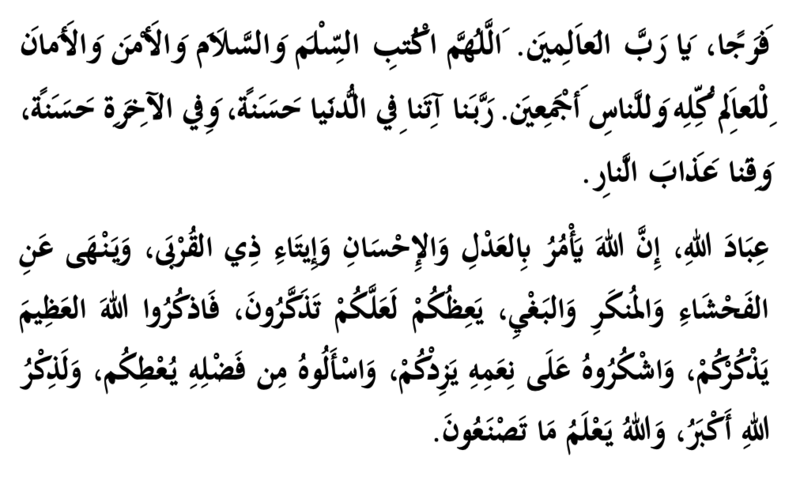

Majlis Ugama Islam Singapura
Friday Sermon
19 September 2025 / 26 Rabiulawal 1447H
Conduits of Sunnah, Dwellers of Jannah

Dear blessed congregation,
Let taqwa be the light that guides us towards the righteous path. Fulfil our obligations to Allah s.w.t. and avoid all that He forbids. Adorn our actions with the sunnah of Prophet Muhammad s.a.w., so that our souls may also be adorned with the garland of faith. Amin, ya Rabbal ‘Alamin.
My dear brothers,
How do we follow the footsteps of Prophet Muhammad s.a.w.? Is it enough to merely learn about his teachings and to believe in them?
Certainly not! Emulating the Prophet is not just about believing in his teachings. More than that, it means following and enlivening his sunnah – including his teachings, his guidance, his behaviour, and his character.
Allah s.w.t. says in Surah Ali ‘Imran, verse 31:

Which means: “Say, (O Prophet) ‘If you love Allah, then follow me; Allah will love you and forgive your sins. For Allah is Most Forgiving, Most Merciful.’”
This verse teaches us a profound truth: if we truly love Allah, we must first follow and emulate Prophet Muhammad s.a.w. In return, Allah s.w.t. will grant us His mercy and forgive our mistakes.
My dear brothers,
How fortunate we are as the followers of the Prophet Muhammad s.a.w., that the sunnah tradition remains alive to this day. It has been preserved through the efforts of scholars across generations. For example, Imam al-Bukhari rahimahullah travelled great distances and devoted his life to collecting the hadith of the Prophet s.a.w. He was so dedicated to the cause that he would perform two rakaat of sunnah prayer each time before recording hadith in his Sahih collection. Why did he go to such lengths?
Scholars like Imam al-Bukhari understood that the hadith tradition, and thus the sunnah of the Prophet, is not merely words, but a living legacy that transcends time. Even though we did not have the opportunity to meet or converse with the Prophet s.a.w. directly, his sunnah continues to be a guiding light for the soul, like a beacon that never fades.
So, what should we do with the legacy of the Prophet’s sunnah? My dear brothers,
The sermon today presents two ways for us to enliven the sunnah in our daily lives.
First: Identify sunnah practices which are easy to perform
Begin with simple sunnah practices so that it is easier for us to apply them with consistency. Among these are the daily supplications compiled in books such as Al-Azkar and Hisnul Muslim, based on hadith for every situation – from waking up, eating, entering and leaving the house or mosque, to going to sleep at night.
For example, one of the supplications the Prophet s.a.w. would recite when leaving the house is:

Which means: “O Allah, I seek refuge in You so that I do not go astray or lead others astray, slip or cause others to slip, oppress or be oppressed, act ignorantly or have ignorance acted upon me.” (Narrated by Abi Dawud)
By practising these supplications, we remain connected to Allah while following the sunnah of the Prophet s.a.w.
If we have not been motivated to practice the sunnah because we give more focus to the obligations, know that sunnah practices can help compensate for shortcomings in fulfilling our obligations, such as in prayer.
Additionally, we should educate our children about the sunnah from a young age. By starting with simple acts, they will learn to appreciate the sunnah tradition, and at the same time come to know and love the Prophet s.a.w.
Second: Make the sunnah a guide for daily life
The sunnah of the Prophet Muhammad s.a.w. is not limited to acts of worship alone. It encompasses matters of character, speech, relationships with family, colleagues, and the wider community.
Yes, fasting on Mondays and Thursdays and performing congregational prayers at the mosque are sunnah acts that should be observed. However, we should not neglect other aspects of the sunnah: assuming well of others is a sunnah, greeting others with a friendly expression is a sunnah, being humble is a sunnah, and being patient in our interactions is also a sunnah.
When someone truly internalises the sunnah, it cultivates balance and discipline in life. They will manage their time well, behave courteously, show compassion to others, and develop awareness of maintaining their health.
Are not activities like horse riding, archery, and swimming also part of the Prophet’s sunnah? Even if we only have the means to exercise in other ways, by making an intention to follow the sunnah of the Prophet s.a.w. in maintaining our health, we hope to earn reward from Allah s.w.t.
Respected Friday congregation,
Prophet Muhammad s.a.w. said that which means: “I leave behind two things for you; you will not go astray as long as you hold fast to them: (the two things are) the Book of Allah and the sunnah of His Prophet.” (Narrated by Malik)
Let us together become the bearers of the Prophet’s sunnah, with the hope that one day we may be worthy inhabitants of Jannah.
May Allah s.w.t. grant us guidance and steadfastness to emulate the Prophet s.w.t. May He fill our hearts with love for the sunnah, making it a source of success in this world and the Hereafter.
Amin, ya Rabbal ‘Alamin.

Second Sermon



